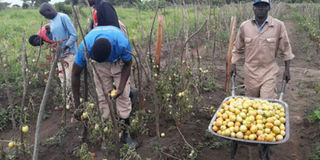Banker who picks his money from crops

Farm workers picking tomatoes at Osegge farm. PHOTO BY SIMON NAULELE
With eyes fixed on the ripe tomatoes, John Michael Osegge walks from one plant to another scouting for pests and signs of diseases.
The crop is on a piece of his sprawling 20-acre mixed farm in Gweri Sub County, Soroti District.
The farmer also grows watermelon, rice, oranges, maize, banana, onions, rice, soybean, passion fruits, citrus and cabbage which he farms all year round. He also keeps rabbits and fish.
Starting
Dressed in a blue T-shirt, khaki trouser and black gumboots, Osegge bends in his tomato garden in Amodoima village and picks a red fruit. “This garden will be ready for harvesting in about a week’s time.” He then continues to check how the other fruits are doing.
Osegge ventured into tomato farming 10 years ago, starting with seedlings worth Shs20,000 on one acre.
Today, the agribusiness has expanded to 20 acres, with more than 10 enterprises. He has named the farm Osegge.
The 51-year-old banker, who works as a microfinance expert, says he fell in love with farming during a tour of a friend’s farm in Amuria District.
His typical day involves supervising dozens of workers he hires as they plant, weed and harvest the various crops.
Market
“Tomato is my favourite crop because it matures in 45 days and not many people grow it. It sits on three acres,” says Osegge, who sells his produce to groceries in Soroti Municipality, Mbale, Amuria, and Kumi townships.
He also sells the produce to schools and some middlemen who come from as far as Kenya at a farmgate price ranging between Shs3,000 and Shs4,000 per kilogramme.
The produce fetches more during the dry spell.
Bananas which sit on four acres are also sold in the same townships with each bunch going for Shs25,000.
A trained banker, Osegge, landed his first job as a customer service attendant with a commercial bank three years after graduating from Makerere University.
He was upbeat when he was posted to the bank’s branch in Soroti District. His work entailed marketing the bank and its products to clients. Meanwhile, he started farming on the side as he juggled agribusiness and banking.
“I used to leave the office early on Friday and go to the farm where I would work throughout the weekend,” he recalls. When it was no longer tenable to handle the two jobs, he resigned and went full-time into agribusiness.
Demand for food
His farming venture has expanded many folds since then. “It takes me two days working on the farm to make as much as I earned. This is what makes me believe I made the right decision.”
So what makes agribusiness tick for Osegge? “Timing is the most important thing in agribusiness. I ensure my crops mature when supply is low to cash in. To reduce irrigation costs, I transplant crops such as cabbage at the beginning of the rainy season,” says Osegge, who studied accounting and finance, and keeps up-to-date farm records.
Challenges
He adds that market trends dictate what he grows. Sometimes clients ask him to plant a particular crop.
But this does not mean that his enterprise is devoid of challenges. His farm is sometimes invaded by animals from neighbouring villages to destroy the crops.
“The crops are also attacked by thrips, leading to high cost of production since one uses expensive chemicals to eliminate them,” says Osegge, who depends on a diesel-powered pump to draw water from the river to irrigate his crops, especially during dry spells.
Advice
He advises young people to venture into agribusiness because demand for food is high, thus there is a ready market. “To go around the challenge of land ownership, young people should consider leasing land,” he offers.




